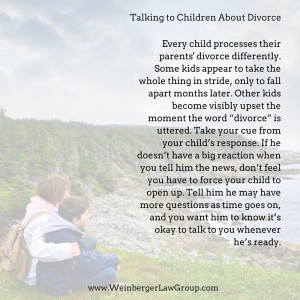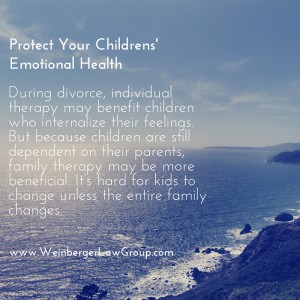5 Things To Say (Or Not To Say) When You Tell Your Kids About Your Divorce
There’s no easy way to tell your kids that life, as they know it, is about to change forever. But there are some ways to make the experience as gentle as possible. How can help your children feel secure and loved during this transition? Here are five things to say, or not say, when you explain to your kids that you’re divorcing.
1. Make a joint announcement. Even if you didn’t initiate the divorce, it is imperative that you and the other parent attempt present the news as a united front, something along the lines of: “your father and I have tried to work out our differences for a long time and we couldn’t, so we’ve decided to get a divorce.” Children should not feel that the divorce is one parent’s fault, and they should not feel that they have to choose sides. So before you deliver the news, you and your soon-to-be-ex will need to plan, and preferably rehearse, what you’re going to say – and not pull any punches when you do say it.
2. Reassure them it’s not their fault. It’s natural for kids to feel that they’re the center of the universe; but that means they’ll also think that they’re at the center of your divorce. Make it abundantly clear that they didn’t cause the problems between the two of you and it’s not their job to try to fix them. Feeling responsible for an adult problem that he can’t control is an awful burden for a child.
3. Keep the details age-appropriate. Although there’s no clear formula for this, a good rule of thumb is the less said the better. For instance, “we tried very hard to solve our problems, and we couldn’t” is enough information for young children. Older children, depending on what they’ve seen or heard, will probably need something more substantial. Tricky subjects such as infidelity or substance abuse should be acknowledged without revealing disturbing details. “Dad needs to stop drinking and he’s going to a place where he can get help,” or “there were infidelities in the marriage” are examples of how to address incendiary topics. If a child is pumping you for details it’s not helpful for her to know (“who wanted the divorce?” “How long was Dad seeing that other woman?”), don’t give them to her! You are the adult, and you determine how much information you deliver to your child, not the other way around.
4. Tell them what’s going to change, and what will remain the same. A parent’s Number 1 job is to make kids feel safe. This doesn’t change when there’s a divorce, although the job gets much more challenging. Let your children know what things are constants: you both will always love them; they will spend time with each parent (in cases where both parents are present); they get to keep their pets; they will attend the same school and have the same friends. Then tell them what’s changing: housing; days spent with each parent (aka parenting time); vacation schedules.
5. Tell them it’s safe to talk about the divorce – but don’t pressure them to talk about it. Every child processes the news differently. Some kids appear to take the whole thing in stride, only to fall apart a week later. Other kids become visibly upset the moment the word “divorce” is uttered. Take your cue from your child’s response. If he doesn’t have a big reaction when you tell him the news, don’t feel you have to force him to open up. Tell him he may have more questions as time goes on, and you want him to know it’s okay to talk to you when he’s ready.
If you’re riddled with guilt, shame, anger, or sadness, you need to keep these feelings in check when you tell your child about the divorce. Giving into any of these emotions will make it more likely that you will say something your children shouldn’t hear, or “bleed out” emotionally and make them feel that the world is going to end. You can’t change the fact of your marriage is ending, but you can model how to overcome adversity through grace and resilience – and that starts with how you tell your kids you’re getting divorced.
How can you best smooth the divorce transition for your children? For assistance with child custody and child support issues, and all other matters related to divorce, our attorneys are here to help. Please contact us to schedule your initial consultation.




